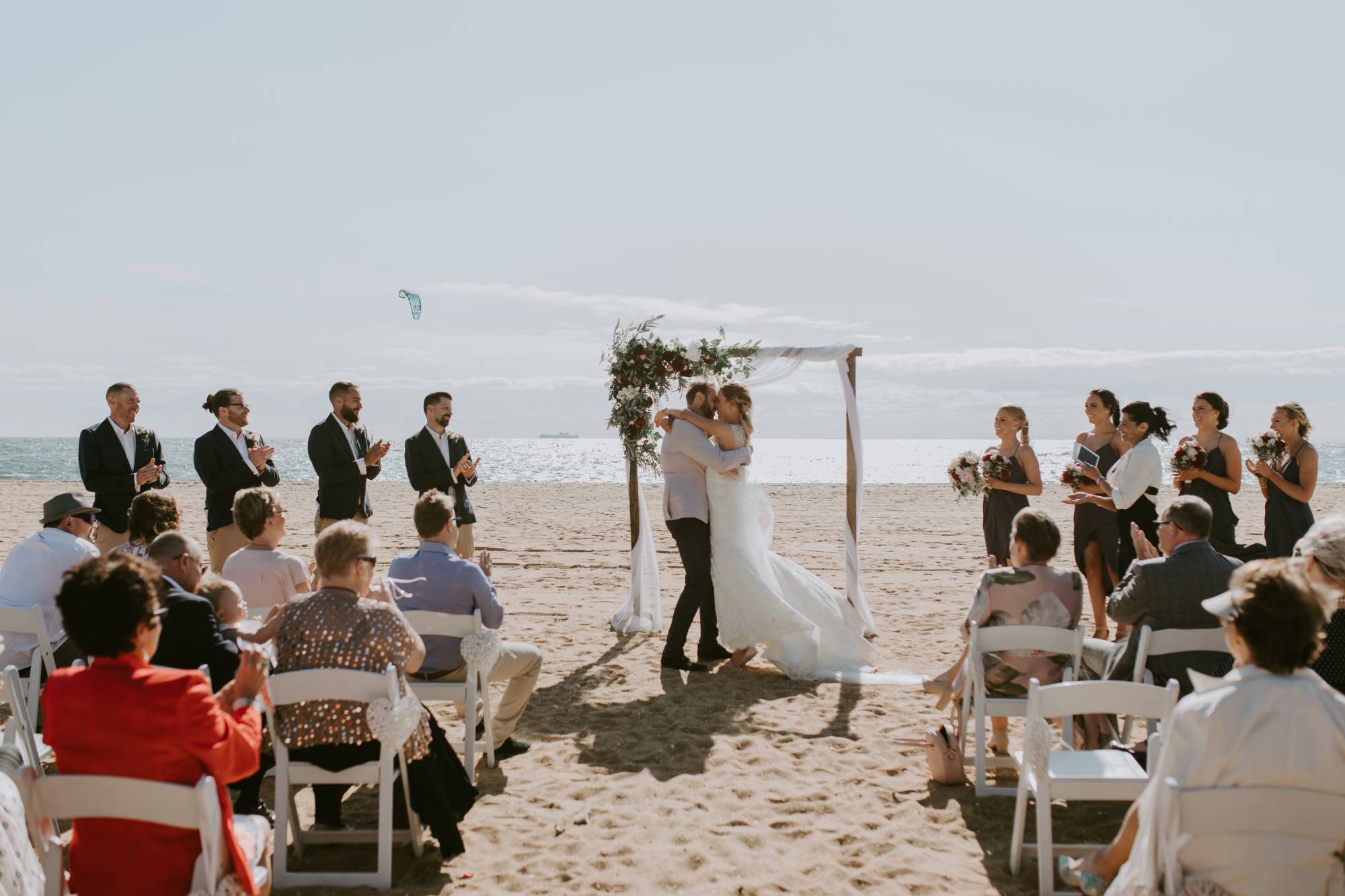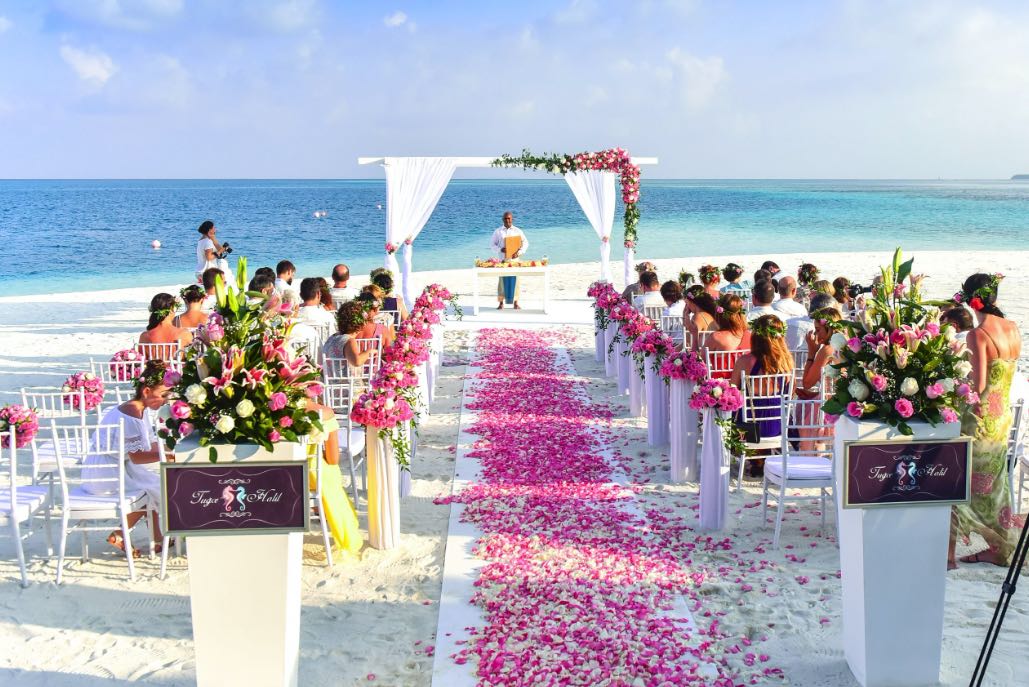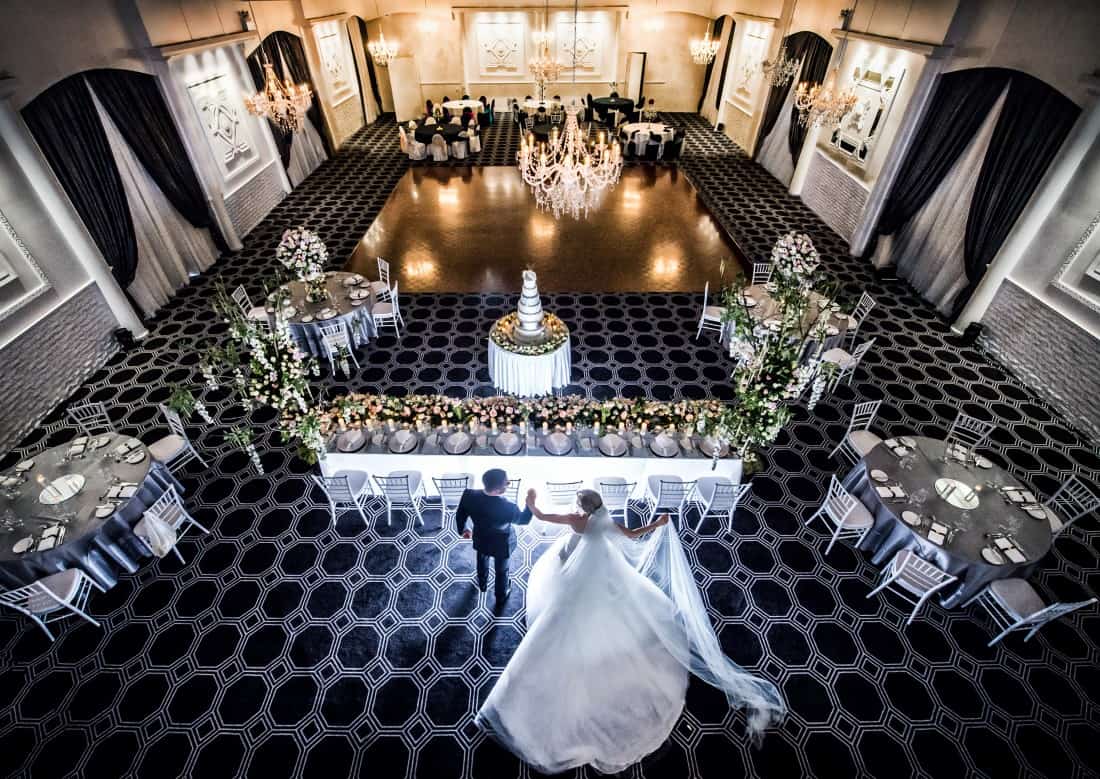Choosing your wedding season is one of the first big decisions you’ll make in planning your day. As someone who got married at Vogue Ballroom in Melbourne, I can tell you firsthand how much the season affects the vibe, style, and overall feel of your wedding. Each season has perks and challenges from spring’s colourful blooms to winter’s cosy charm.
But don’t stress—picking the right one doesn’t have to be overwhelming. I’ll walk you through the pros and cons of each season, share some personal stories, and offer practical tips to help you nail your wedding timing.
What is the Best Wedding Season in Australia?
Why Your Wedding Season Choice Matters
Choosing your wedding season in Australia is more than just picking a date. It’s about the atmosphere you want to create for your day. From my own experience at Vogue Ballroom, I realised how much the season sets the tone, whether it’s the warmth of summer or the crisp air of winter.
Here’s why the season matters:
- Weather and atmosphere: Will you have an outdoor ceremony? Are you envisioning lush gardens or cosy indoor settings?
- Seasonal vibes: Spring brings flowers, while winter offers a more intimate feel with colder temps and warm lighting.
- Guest comfort: Consider how the season will affect your guests, especially if you’re in a hot or cold region.
How Seasons Impact Your Wedding Planning and Budget
The season you choose can significantly impact both your planning and budget. Trust me, I’ve seen this firsthand when I helped couples plan their weddings.
Spring/Summer (Peak Season):
- Higher demand, higher costs: Venues and vendors are in high demand, meaning prices will spike.
- Booking time: You’ll need to book 10-12 months in advance to secure top vendors and venues.
- Examples: A couple in Sydney had to book their florist in advance to get peonies, which are only available in spring.
Autumn/Winter (Off-Peak Season):
- Lower costs: Venues and vendors may offer discounts during these off-peak months.
- More flexibility: Less competition for dates, so you might score better deals.
- Example: I helped a couple get a winter wedding deal in Melbourne that was 25% cheaper than a summer date. They took advantage of the quieter season to secure their dream venue at a better price.
The season you choose will shape your budget, so think about what’s more important to you—saving money or having a peak-season wedding.
Spring Weddings: The Ideal Choice for a Flourishing Celebration
Why Spring Weddings Are Perfect for Outdoor Ceremonies
Spring in Australia is a dream for wedding lovers. After the chill of winter, it brings warm, mild weather—perfect for outdoor ceremonies. If you’re picturing vows under a blooming arch or saying “I do” surrounded by vibrant flowers, spring is where it’s at.
From my own experience, the beauty of spring weather can’t be overstated. At Vogue Ballroom, we had a spring wedding with the most stunning garden views. The temperature was just right—not too hot, not too cold—allowing our guests to enjoy the outdoor ceremony comfortably.
Why spring works:
- Mild temperatures: Ideal for both indoor and outdoor celebrations.
- Beautiful backdrops: Flowering gardens, lush greenery, and the promise of blue skies.
- Comfortable attire: No need for bulky jackets or summer sweats—perfect for those dreamy wedding dresses.
Spring Wedding Trends You Can’t Miss
Spring weddings are all about colour, light, and freshness. Whether you’re leaning towards a classic vibe or something more modern, the season offers endless possibilities. From pastel colour schemes to floral arrangements, spring brings it all.
Popular spring wedding trends:
- Floral everything: Think peonies, daisies, and roses, all in bloom during this time. These flowers are perfect for bouquets, centrepieces, and even wedding crowns.
- Pastel colour palettes: Soft pinks, peaches, lavender, and light blues are in full swing. It gives your wedding a fresh, light, and romantic feel.
- Outdoor receptions: With the weather being so pleasant, couples are opting for garden receptions, al fresco dining, or vineyard settings.
One couple I worked with in Sydney chose a spring wedding in October and created the most magical ceremony with rose petals scattered down the aisle and lavender bouquets for the bridal party. Their wedding felt like a fairy tale—everything was in bloom, and the warm weather made it feel even more special.
A Spring Wedding in Sydney
I worked with a lovely couple in Sydney who wanted a spring wedding surrounded by nature. They picked October, which is considered one of the most picturesque months in the city. The gardens were in full bloom, and the weather was just perfect—cool enough for comfort but warm enough to enjoy being outside.
The couple was able to book a stunning outdoor venue that otherwise would’ve been out of their budget during the summer rush. They had a garden ceremony with a string quartet playing softly in the background, and their reception was held under a marquee lit by fairy lights.
What stood out about their day? How effortless everything felt, thanks to the season. No worries about harsh summer sun or rainy days—it was the sweet spot for a beautiful, relaxed wedding. If you’re looking for a perfect blend of beauty, weather, and budget-friendly options, spring weddings should be at the top of your list.
Summer Weddings: The Ultimate Party Vibe or a Scorching Affair?
The Pros and Cons of Summer Weddings
Summer weddings in Australia can be absolutely stunning. The long, sunny days, warm temperatures, and festive vibes make it the perfect season for a celebration. But, as anyone who’s experienced a hot Aussie summer knows, it comes with its own set of challenges.
From my own experience, planning a summer wedding meant we had to be mindful of the heat and the possibility of weather interruptions. While it was beautiful to have a sun-filled ceremony, we also had to think carefully about the comfort of our guests, especially older relatives and those with little ones.
Pros of a summer wedding:
- Long days, lots of light: Perfect for outdoor ceremonies and extended photo sessions. You can enjoy the “golden hour” well into the evening.
- A lively, fun vibe: Think beach weddings, garden parties, or grand ballroom receptions with a carefree, party atmosphere.
- Plenty of venue options: Summer makes outdoor venues, like vineyards and beaches, a possibility, with endless possibilities for décor.
Cons of a summer wedding:
- Heat and humidity: Summer temperatures can climb quickly, making it uncomfortable for guests, especially if you’re having an outdoor ceremony.
- Rain and storms: In places like Brisbane or the Gold Coast, summer brings the risk of rain, which could dampen your plans.
- Higher costs: Summer is peak wedding season, which means higher prices for venues, vendors, and even accommodation for your guests.
If you’re thinking about a summer wedding, just be sure to prepare for the heat and ensure your guests will be comfortable.
Planning Your Summer Wedding in Hot Climates
Having a wedding in a hotter region, like Brisbane or Perth, adds another layer of complexity. You’ll need to be proactive in planning to avoid uncomfortable conditions.
Tips for a successful summer wedding:
- Cooling options: Provide shade, fans, or air-conditioned spaces for your guests. If your ceremony is outdoors, make sure there’s enough cover to protect everyone from the sun.
- Dress for comfort: Consider lighter fabrics for your wedding attire—breathable gowns, linen suits, or short sleeves can make a big difference.
- Stay hydrated: Offering cool beverages like iced water, sparkling drinks, or cocktails can keep guests refreshed throughout the day.
- Sun protection: Include sunscreen in your wedding guest favours, or provide sun hats for everyone, especially if you’re outdoors during midday heat.
When I worked with a couple in Perth, they had a summer wedding by the beach. It was gorgeous, but they made sure to keep the guests comfortable with an outdoor bar serving cool drinks, and they rented fans to ensure everyone stayed cool. It was a wonderful day, but their attention to detail made all the difference.
Autumn Weddings: When Mild Weather and Beautiful Foliage Meet Romance
Why Autumn Is the Sweet Spot for Wedding Planning
Autumn in Australia is a wonderful middle ground—it’s not too hot, not too cold, but just right for a comfortable, beautiful wedding. If you’re aiming for a relaxed, romantic vibe, autumn might just be the perfect fit.
I’ve helped many couples choose autumn, and it’s always a winning choice. The crisp air, mild temperatures, and gorgeous colours of fall foliage make it an ideal time for wedding ceremonies and receptions. It’s like nature itself gives your wedding a beautiful backdrop.
Why autumn is great:
- Mild weather: Perfect for both outdoor and indoor celebrations. It’s comfortable for your guests and ideal for those who don’t want the extreme heat of summer or the cold of winter.
- Colourful foliage: Think warm oranges, reds, and yellows—autumn’s vibrant colours offer a stunning backdrop for photos and wedding décor.
- Off-peak advantages: Compared to peak spring and summer months, autumn can be a more affordable option, with less demand for venues and vendors.
Must-Know Tips for Planning an Autumn Wedding
Autumn weddings offer flexibility, but there are a few things to consider to make sure your wedding goes off without a hitch. The season can bring cooler evenings, so it’s worth thinking about how to keep your guests comfortable.
Top autumn wedding tips:
- Layer up: For a ceremony outdoors, consider providing shawls, pashminas, or light jackets for your guests. You could also opt for a long-sleeved wedding gown or stylish wraps for the bridal party.
- Use seasonal colours: Incorporate autumn’s rich tones into your décor, flowers, and even your wedding attire. Deep reds, golds, and earthy tones are all popular choices for autumn weddings.
- Think about lighting: As daylight shortens, outdoor receptions might need extra lighting. String lights, lanterns, or candles can create a cosy, intimate atmosphere.
I worked with a couple in Melbourne who opted for an autumn wedding in April. The weather was perfect—mild and fresh—but they also planned for cooler evenings with cozy blankets for guests. Their reception had warm lighting, creating a gorgeous, intimate vibe that matched the season’s charm.
Winter Weddings: A Cozy and Intimate Celebration
The Advantages of a Winter Wedding
Winter in Australia might not be the first season that comes to mind for most couples, but it offers a charm and intimacy that can’t be beaten. If you’re after a wedding with a cosy, romantic atmosphere, winter could be your perfect season.
I’ve worked with many couples who chose winter weddings, and they always appreciate the quiet, peaceful feel that winter brings. When you marry in winter, there’s something magical about the idea of wrapping up in a beautiful, warm dress, and having an intimate gathering by the fire or in a stunning indoor venue.
Why winter works:
- Cozy vibe: Picture a candlelit ceremony or reception in a warm, elegant venue. Think fireplaces, soft lighting, and rich décor.
- Off-peak prices: Winter tends to be off-peak, which means you can snag a fantastic deal on venues and vendors. Less competition for dates often leads to better prices.
- Unique photos: Snow, misty mornings, or the crisp blue skies of a clear winter day can create breathtaking wedding photos.
How to Make the Most of Shorter Days and Cold Weather
Winter days can be short, so you’ll want to plan your ceremony and photos around the daylight hours. But that doesn’t mean you can’t still have a gorgeous wedding.
Top tips for a successful winter wedding:
- Embrace the cold: Instead of shying away from the weather, use it to your advantage. Outdoor photos in the crisp air can be stunning, and there’s something about a winter landscape that makes for unforgettable wedding shots.
- Layer up in style: A stylish wrap, a bolero, or even a vintage fur stole can elevate your bridal look and keep you warm. Plus, they make for stunning photo opportunities.
- Lighting: Because the days are shorter, your ceremony and reception may need extra lighting. Think candles, fairy lights, and chandeliers to add warmth and charm to the atmosphere.
I worked with a couple in Tasmania who had their winter wedding in June. The venue had an incredible fireplace, and the couple added a touch of luxury with hot chocolate stations and cosy blankets for guests. The snow-capped mountains in the distance made for some jaw-dropping photos.
Choosing Your Wedding Month: Which Is Right for You?
Australia’s Most Popular Wedding Months
When it comes to picking a specific month for your wedding, certain times of the year stand out as more popular than others. Based on my experience helping couples plan their weddings, I can tell you that some months are in higher demand, which means booking early is key.
Here’s a breakdown of the most popular wedding months in Australia:
- March and November: These are consistently the top wedding months in Australia. Why? They offer mild, pleasant weather, making them ideal for both outdoor and indoor weddings. If you’re aiming for a spring or autumn wedding, these months are often your best bet.
- October to April: These months are often the busiest, with beautiful weather and higher demand for venues and vendors. If you want a spring or summer wedding, aim for these months, but be prepared for a competitive wedding market.
When Are Weddings in Australia Least Preferred?
While March and November steal the spotlight, there are a few months where weddings aren’t as common. That doesn’t mean they’re a poor choice, but you may face fewer options in terms of availability and pricing.
- January and February: These months are considered less ideal for weddings, particularly because of extreme heat and the potential for bushfires. If you’re planning a wedding in a hot climate like Brisbane, these months can be tough.
- June and July: While winter weddings can be magical, June and July are the coldest months in Australia. If you’re looking for a sunny outdoor ceremony, these months might not be your first choice.
Despite this, there’s still beauty to be found in any month. Whether you’re looking for summer vibes or something cosy in the winter, the key is knowing what you want and planning accordingly.
What Factors Should You Consider When Choosing Your Wedding Date?
Venue and Vendor Availability: How to Secure Your Dream Team
When choosing your wedding date, one of the first things to think about is availability. Popular venues and vendors can book up quickly, especially during peak wedding season. If you’ve got your eye on a particular venue or photographer, you’ll need to act fast—sometimes even a year or more in advance.
Tips for booking your dream team:
- Start early: The earlier you book, the more likely you are to get your top picks for venues and vendors. If you’re planning for spring or summer, consider booking 12-18 months in advance.
- Be flexible with your date: If your dream venue is booked on your ideal date, consider shifting by a few days or even a week. A little flexibility could save you from disappointment.
- Off-peak advantages: Winter weddings often provide more flexibility in venue and vendor selection, as fewer couples are competing for the same dates.
I worked with a couple who had their heart set on a particular venue in Melbourne. The venue was booked for almost every Saturday during spring, so they opted for a Friday wedding instead. They were able to secure their dream spot and get better pricing as a result.
Budgeting for Your Wedding Season
The season you choose will have a direct impact on your wedding budget. As I mentioned earlier, spring and summer tend to be more expensive due to high demand, while autumn and winter are often more affordable.
Budget tips based on the season:
- Spring and Summer: Expect to pay more for venues, vendors, and even catering. You may also face higher accommodation costs for your guests during peak season.
- Autumn and Winter: These off-peak seasons can offer substantial savings, especially when it comes to venue and vendor costs. You might be able to secure discounts, or even get extras thrown in (like upgraded décor or a larger venue package).
The couple I helped with their winter wedding in Melbourne saved 20% by choosing an off-peak season. This extra room in the budget allowed them to upgrade their menu and hire a photographer for an additional two hours.
Guest Availability and Travel Considerations
Another factor to consider is whether your guests can make it to your wedding. If you’re planning a destination wedding, or one in a less-travelled location, make sure to choose a time that’s convenient for your loved ones.
Guest considerations:
- School holidays: Try to avoid school holidays if possible, as this can make travel and accommodation more expensive. However, if you want guests to bring their kids, scheduling your wedding during school holidays could be helpful.
- Public holidays: If your wedding falls around a public holiday, some guests might take advantage of the long weekend and plan family vacations. It’s worth checking local calendars to avoid clashes.
Tips for Getting Your Wedding Right, No Matter the Season
How to Choose Wedding Attire Based on the Weather
Your wedding attire should reflect the season—there’s no way around it! When I helped my clients plan their weddings, we always made sure their dresses and suits were perfect for the weather.
Wedding attire tips for each season:
- Spring/Summer: Go for lighter fabrics like silk, chiffon, or lace that breathe. Think off-the-shoulder dresses, short sleeves, or even sleeveless options. Gentlemen, consider linen suits or lightweight fabrics for comfort.
- Autumn/Winter: Layer up! Opt for long-sleeve gowns or dresses with wraps and boleros. The groom can also wear thicker fabrics like wool or velvet to stay warm without compromising on style.
Personal tip: When I got married, I opted for a sleeveless dress for our spring wedding at Vogue Ballroom, but I brought a delicate shawl for when it got chilly in the evening. It was practical and pretty!
Photography Tips: Best Lighting for Every Season
Lighting is one of the most important factors in wedding photography, and the season you choose plays a huge role in this.
Best lighting for each season:
- Spring/Summer: You’ll get plenty of daylight, but the best photos happen during the “golden hour”—the hour before sunset when the light is soft and warm. If you’re planning an outdoor ceremony, try to schedule your photos around this time.
- Autumn: Autumn often provides the best natural light for photos. The sun has a golden hue, and the colours of the leaves create a beautiful backdrop for your pictures.
- Winter: Winter has shorter days, so you may need to take photos earlier in the day. But the soft, cool light can be perfect for a dramatic, intimate feel. You can also use candles and fairy lights to create a romantic, warm atmosphere for evening shots.
Ultimately, the best season for your wedding depends on what kind of vibe, atmosphere, and experience you want. From the sunny charm of summer to the cosy magic of winter, each season offers something unique.




